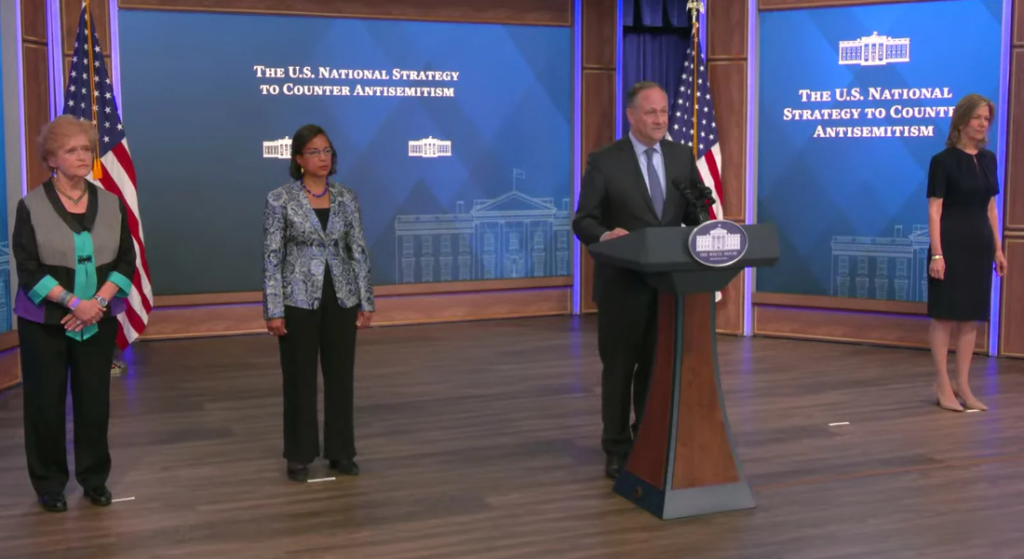It’s been two weeks since the White House released the national strategy to counter antisemitism. Earlier this year, I was privileged to be included in a consultation organized by the White House as they sought intake from a wide spectrum of community leaders and stakeholders. Over these past two weeks, I’ve had the opportunity to read the plan carefully and closely, meet with a wide range of national Jewish leaders (including opponents of the administration), engage with members of the White House team who prepared this, and read much analysis, and some critique, of the strategy.
I believe that as a whole, this plan represents a historic moment and an opportunity for our community. It is an overwhelmingly positive contribution to our needs and our efforts in the struggle against antisemitism.
For years, we have said that antisemitism is society’s problem and responsibility. Now, for the first time in history, we have the full force of the White House behind the articulation that “combatting antisemitism is a truly whole-of-society challenge that demands a whole-of-society response.”
And the Biden-Harris plan is a response that delivers.
It lays out comprehensive and measurable commitments across the federal government. It has clear calls to action – not just for Congress, but for state and local governments, for business, faith, cultural, sports and educational communities, among others. It goes deep, sometimes surprisingly so, into examples of steps that can be taken throughout society.
The Biden-Harris administration explicitly reaffirms the American embrace– a posture that goes back to the decision of then President Obama and Secretary of State Kerry– of the non-legally binding IHRA Working Definition of antisemitism, and commits to combatting antisemitism “including efforts to delegitimize the State of Israel”. And while much focus has been given to the reaffirmation of this definition in the document, more importantly the substance of the plan focuses on ‘actions to counter antisemitism” – at great length.
Allow me to highlight just a few of the ways in which the Biden-Harris plan will be of extraordinary value to our work as JCRC in addressing antisemitism locally; work that we do in partnership with CJP’s 5-point plan for our local efforts.
As we build from our success in mandating genocide education, to focusing more broadly on K-12 educational content in our public schools here in Massachusetts, it is unequivocally valuable that the Biden-Harris administration “call(s) on state and local government to include Jewish studies in ethnic studies curriculum”. It also calls on all employers, including states, cities, educational institutions, and the private sector to “review their own diversity, equity and inclusion… programs to insure full inclusion of antisemitism awareness and training.”
It will have a profound impact on our community and will change the conversation on inclusion and accommodation if the plans’ executive branch actions regarding access to kosher and halal foods in an USDA feeding programs are met, and then modeled upon as a principal and in action at all levels of society. Normalizing best practices for religious accommodation for students and staff in schools across the nation, along with dissemination of EEOC materials on antisemitism in the workplace later this year, will help us enormously in supporting the needs of these members of our community, and in transforming the conversation about accommodation at every level.
Even as the Biden-Harris strategy reaffirms the need and the call for full funding of non-profit security, it adds to and expands that conversation in significant and important ways, outlining efforts for strengthening social services to survivors of hate crimes, support for victim advocate programs, and naming the need for culturally competent mental health services – an issue JCRC is already working on with our partners on Beacon Hill.
And just as the CJP plan names building ‘allyship’ as a key component, the national strategy calls for efforts toward cross-community solidarity and collective action. The details of this call, and the investments it advocates for in intergroup engagement, multifaith partnership, and civil solidarity work, are vital and necessary.
No plan is ‘perfect’. Any 60-page plan could have said some things differently. And there will always be additional ideas and tactics that can and should be added to a whole-of-society approach. There are even specific criticisms – including one in particular about one element of a separate fact-sheet that, while not part of the national strategy itself, is deeply troubling – that I wholly agree with.
But all in all, this is a helpful and historic document, reflective of this moment of crisis and meeting this moment in a way that we should not assume as a given for any administration in Washington.
And for that, on the whole, this is a welcome effort. Now we, all of society, must heed the call and take action.
We’ll continue to do our part, here in Boston. We hope you’ll join us in that effort and support out work to implement the Biden-Harris plan here in Massachusetts.
In fact, we’re excited to announce that JCRC will hold a Special Briefing with Ambassador Deborah Lipstadt on the White House Strategy to Counter Antisemitism on Wednesday, June 21 at 10:30AM ET. REGISTER HERE!
Shabbat Shalom,
Jeremy


